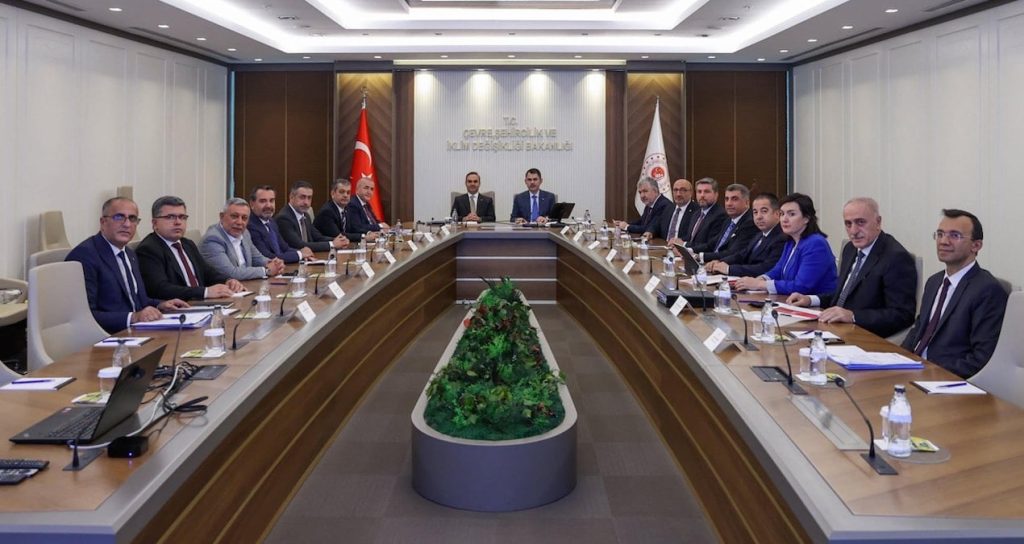Recently, a key meeting took place in Ankara involving Elazığ’s Governor and local lawmakers to discuss the relocation of a cement factory causing significant environmental issues. In attendance were high-ranking officials, including the Minister of Environment and Minister of Technology, yet the presence of a local political party chairman without official capacity raised eyebrows. The gathering highlighted ongoing tensions regarding the influence of non-elected political figures in government affairs, reigniting debates regarding the intertwining of political influence and public health concerns in the region.
| Article Subheadings |
|---|
| 1) Overview of the Meeting and Its Participants |
| 2) Urgent Need for Environmental Change |
| 3) Political Implications of Party Influence |
| 4) Concerns Over Public Health and Safety |
| 5) Next Steps and Future Considerations |
Overview of the Meeting and Its Participants
The meeting in Ankara was a significant collaboration between Elazığ’s Governor, Numan Hatipoğlu, along with local deputies and ministers concerning a pressing environmental issue. Attendees included Şahin Şerifoğulları, the Mayor of Elazığ, along with several deputies from the AKP, MHP, and CHP. The primary aim of the meeting was to address the environmental ramifications caused by the cement factory operating within the city limits. Officials expressed an urgent need for a strategic relocation to safeguard local residents and improve urban conditions. Although the government coordinated the meeting, the involvement of a notable political figure from the AKP without an official role in the state sparked concern among attendees.
Urgent Need for Environmental Change
The cement factory in question has faced criticism for its adverse environmental impact, which has become a significant concern for the local community. During discussions, the meeting underscored the critical need for relocating the facility away from the densely populated urban area of Elazığ. The factory’s operations have been linked to various health hazards, leading to calls from officials to prioritize the health and safety of the public. By emphasizing the factory’s environmental footprint, this meeting’s discussions aim to catalyze more extensive industrial reforms within the urban landscape of Elazığ.
Political Implications of Party Influence
The presence of Şerafettin Yıldırım, the AKP’s provincial chairman, at the high-level meeting has raised significant eyebrows. The controversial involvement of party leadership in state discussions is seen as an overreach, particularly since Yıldırım holds no official capacity that grants him a stake in governmental decisions. The incident highlights a growing concern regarding the state’s bureaucratic integrity and prompts discussions on the implications of having political figures involved in administrative decisions without electoral backing. Critics argue that such situations erode public confidence in the decision-making process and raise questions about the true representation of public interest.
Concerns Over Public Health and Safety
Public health risks linked to the cement factory’s emissions constitute a critical aspect of the discussions held during the meeting. The negative health effects are well-documented, leading local citizens and community leaders to call for urgent intervention. Acknowledging that further delay exposes residents to additional health risks, officials expressed the need for transparency and accountability in addressing these urgent issues. The priority is to ensure that any plans developed to move the factory align with the public’s best interests while safeguarding the health of the community.
Next Steps and Future Considerations
As a result of the meeting, officials aim to develop a comprehensive plan to facilitate the relocation of the cement factory outside of Elazığ. The next steps will involve consultation with stakeholders, including environmental experts and local citizens, to gather input and ensure that any new location adheres to necessary environmental regulations. The proposed timeline for the relocation is still under discussion, but there is a clear acknowledgment of the urgency in executing this transition. The community continues to seek assurance that their voices are heard in the ongoing dialogues surrounding this important public health issue.
| No. | Key Points |
|---|---|
| 1 | An important meeting was held to discuss relocating a hazardous cement factory in Elazığ. |
| 2 | Local health concerns prompted officials to prioritize the factory’s relocation. |
| 3 | The presence of non-elected political party leaders raised concerns over political interference. |
| 4 | Transparency and public health remain key themes in discussions about the factory’s future. |
| 5 | Future actions will include community consultations for a proposed relocation plan. |
Summary
In conclusion, the meeting held to discuss the relocation of the cement factory in Elazığ underscores a broader narrative of environmental health and political influence in community decision-making. While the health implications are clear and urgent, the way forward must navigate the complexities of local governance and public interest. Engaging the community in future dialogues remains crucial for ensuring transparency and fostering trust in local governmental processes.
Frequently Asked Questions
Question: Why is there a need to relocate the cement factory?
The cement factory has been criticized for environmental pollution, posing health risks to residents in Elazığ, which necessitates its relocation to protect public health.
Question: Who attended the meeting regarding the cement factory?
Attendees included Elazığ’s Governor, local deputies from various political parties, and ministers responsible for environmental and technological matters, sparking concern over non-elected political figures’ involvement.
Question: What are the next steps following the meeting?
The next steps include developing a comprehensive relocation plan that will involve consultations with community stakeholders to address their concerns and gather input.


